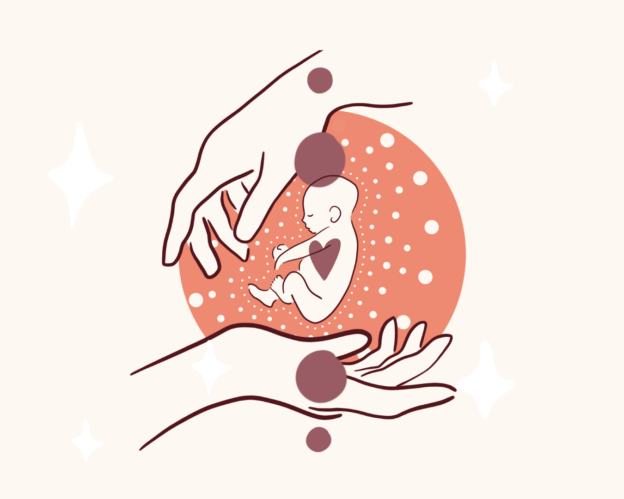Geschreven door Kim Geene
Gepubliceerd 17 juni 2022
Laatste update april 2025 door Margot van Dijk
Ongeveer 10-15% van de zwangerschappen eindigt in een miskraam en 1-3% van de stellen krijgt te maken met een herhaalde miskraam (RCOG, 2011; ESHRE, 2017; NVOG, 2007). De definitie van ‘herhaalde miskraam’ wisselt per onderzoek, maar in dit artikel wordt uitgegaan van twee of meer miskramen als definitie.
Wat kan de oorzaak zijn van meerdere miskramen? Wat kan er mogelijk worden onderzocht? In hoeverre is het Nederlandse beleid (uitgaande van bestaande richtlijnen) up-to-date? In dit artikel wordt antwoord gegeven op deze en meer vragen.
Meer over het doormaken van een miskraam lees je in het artikel Verliesgeboorte.
- ACOG: The American College of Obstetricians and Gynecologists (2016) Repeated Miscarriages. Geraadpleegd via https://www.acog.org/womens-health/faqs/repeated-miscarriages Op 19 april 2022
- ASRM: Practice Committee of the American Society for Reproductive Medicine. (2012) Evaluation and treatment of recurrent pregnancy loss: a committee opinion. Fertil Steril. Vol. 98, p:1103-1111.
- Bedaiwy MA, Maithripala SI, Durland US, et. al. (2016) Reproductive outcomes of couples with recurrent pregnancy loss due to parental chromosome rearrangement. Fertil Steril. Vol. 106, p.343. doi:10.1016/j.fertnstert.2016.07.970 B
- oogaard van den E, Vissenberg R, Land JA, van Wely M, van der Post JA, Goddijn M, Bisschop PH. (2011). Significance of (sub)clinical thyroid dysfunction and thyroid autoimmunity before conception and in early pregnancy: a systematic review. Hum Reproductive Update. Vol. 17: 605-619
- Brigham, S.A. et. al. (1999). A longitudinal study of pregnancy outcome following idiopathic recurrent miscarriage. Human Reproduction. Vol. 14, p. 2868-2871
- Carp, H. et. al. (2001). Karyotype of the abortus in recurrent miscarriage. Fertil Steril, Vol. 75, p. 678-682
- Coomarasamy A, Williams H, Truchanowicz E, Seed PT, Small R, Quenby S, Gupta P, Dawood F, Koot YE, Bender Atik R et al. ( 2015). A Randomized Trial of Progesterone in Women with Recurrent Miscarriages. The New England Journal of Medicine. Vol. 373, p. 2141-2148
- Creus et. al. (2013). Plasma homocysteine and vitamin B12 serum levels, red blood cell folate concentrations, C677T methylenetetrahydrofolate reductase gene mutation and risk of recurrent miscarriage: a case-control study in Spain. Clinical Chemistry and Laboratory Medicine, Vol. 51, p. 693-699
- Devall, AJ, et. al. (2021). Progesterone for preventing miscarriage: a network meta-analysis. Cochrane Database of Systematic Reviews. https://doi.org/10.1002/14651858.CD013792.pub2.
- Dijk van, MM, et. al. (2020) Recurrent pregnancy loss: diagnostic workup after two or three pregnancy losses: A systematic review of the literature ad meta-analysis. Human Reproduction Update, Vol. 26, p. 356-367
- Dimitridis E. et. al. (2020). Recurrent Pregnancy Loss. Nature Reviews Disease Primers , Vol. 6 D'Uva M, Di Micco P, Strina I, Alviggi C, Iannuzzo M, Ranieri A, Mollo A, De Placido G. (2007). Hyperhomocysteinemia in women with unexplained sterility or recurrent early pregnancy loss from Southern Italy: a preliminary report. Thrombosis Journal. Vol.5 doi: 10.1186/1477-9560-5-10
- Empson M, Lassere M, Craig J, Scott J. (2005). Prevention of recurrent miscarriage for women with antiphospholipid antibody or lupus anticoagulant. Cochrane Database Systematic Reviews
- ESHRE: European Society of Human Reproduction and Embryology (2017) Early Pregnancy Guideline Development Group. Geraadpleegd via https://www.eshre.eu/-/media/sitecore-files/Guidelines/Recurrent-pregnancy-loss/ ESHRE-RPL Guideline_27112017_FINAL_v2.pdf?la=en&hash=34DB7D51CF98BFC3DA48FAAA7E7DAED670BA6A83 op 8 april 2022
- Flynn H, Yan J, Saravelos SH, Li TC. (2014) Comparison of reproductive outcome, including the pattern of loss, between couples with chro- mosomal abnormalities and those with unexplained repeated miscarriages. Journal of Obstetrics Gynaecol Res, Vol. 40. p.109-116. doi:10.1111/jog.12133
- FREYA (2016) Herhaalde Miskraam. Graadpleegd via https://www.freya.nl/brochures/herhaalde-miskramen-2/ op 29 maart 2022
- Gonçalves DR, Braga A, Braga J, Marinho A. (2018) Recurrent pregnancy loss and vitamin D: A review of the literature. American Journal of Reproductive Immunology. Vol. 80. doi: 10.1111/aji.13022
- Haas, DM et. al. (2019) Progesterone for preventing miscarriage in women with recurrent miscarriage of unclear etiology: review. Cochrane database of Systematic Reviews. DOI: 10.1002/14651858.CD003511.pub5
- Ikuma S, Sato T, Sugiura-Ogasawara M, Nagayoshi M, Tanaka A, Takeda S. (2015) Preimplantation genetic diagnosis and natural conception: a comparison of live birth rates in patients with recurrent pregnancy loss associated with translocation. PLOS ONE. doi:10.1371/journal.pone.0129958
- Jaslow CR, Carney JL, Kutteh WH. (2010) Diagnostic factors identified in 1020 women with two versus three or more recurrent pregnancy losses. Fertil Steril. Vol. 93, p.1234-1243
- Jong de, PG, et. al. (2014) Aspirin and/or heparin for women with unexplained recurrent miscaariage with or without inherited thrombophilia. Cochrane Database of Systematic Reviews. Issue 7, DOI: 10.1002/14651858.CD004734.pub4
- Kit Lim, M et. al. (2020) Characterisation of serum progesterone and progesterone-indiced blocking factor (PIBF) levels across trimesters in healthy pregnant women. Scientific Reports. Vol. 10, p. 3840
- Li N, et. al. (2017). Women with recurrent spontaneous abortion have decreased 25(OH) vitamin D and VDR at the fetal-maternal interface. Brazilian Journal of Medical Biological Research. Vol. 50
- NICE: National Institute for Health and Care Excellence (2015) Hysteroscopic metroplasty of a uterine septum for recurrent miscarriage. Geraapleegd via https://www.nice.org.uk/guidance/ipg510/resources/hysteroscopic-metroplasty-of-a-uterine-septum-for-recurrent-miscarriage-pdf-1899871738675909 op 14 april 2022
- Nikitina, T.V. et. al. (2020) Karyotype evaluation of repeated abortions in primary and secondary recurrent pregnancy loss. Journal of Assisted Reproduction and Genetics, Vol. 37, p. 517-525
- NVCK (2022) Algemeen Overzicht referentiewaarden. Geraadpleegd via https://www.nvkc.nl/algemeen-overzicht-referentiewaarden op 22 april 2022
- NVOG, Federatie Medisch Specialisten (2012, laatst geupdate in 2022). Richtlijn Miskraam. Geraadpleegd via https://richtlijnendatabase.nl/richtlijn/miskraam/startpagina_-_miskraam.html, op 21 april 2022
- NVOG, Federatie Medisch Specialisten (2007) Richtlijn Herhaalde Miskraam. Geraadpleegd via https://www.nvog.nl/wp-content/uploads/2017/12/Herhaalde-miskraam-2.0-08-06-2007.pdf op 14 april 2022
- Ogasawara, M et. al. (2000). Embryonic karyotype of abortuses in relation to the number of previous miscarriages. Fertil Steril, Vol. 73, p. 300-304
- Ota, K et. al. (2014). Vitamin D deficiency may be a risk factor for recurrent pregnancy losses by increasing cellular immunity and autoimmunity. Human Reproduction. Vol. 26, p. 208-219
- Palacios, C et. al. (2019) Vitamin D supplementation for women during pregnancy. Cochrane Database Systematic Reviews. https://doi.org/10.1002/14651858.CD008873.pub4
- Pang L-H, Li M-J, Li M et al. (2011) Not every subseptate uterus requires surgical correction to reduce poor reproductive outcome. International Journal of Gynecology and Obstetrics. Vol. 115, p.260-263 Premakumari, E. et. al. (2018). Evaluation of homocysteine and folic acid levels in pregnancy loss. Journal of Evolution of Medical and dental sciences. Vol. 7, p. 2926-2930
- Puri M, Kaur L, Walia GK, Mukhopadhhyay R, Sachdeva MP, Trivedi SS, Ghosh PK, Saraswathy KN (2013) MTHFR C677T polymorphism, folate, vitamin B12 and homocysteine in recurrent pregnancy losses: A case control study among north Indian women. Journal of Perinatal Medicine. Vol. 41, p. 549-554. https://doi.org/10.151 5/jpm-2012-0252
- Raghupathy, R, en J. Szekeres-Bartho (2022) Progesterone: A unique Hormone with Immunomodulatory roles in pregnancy. International Journal of Molecular Sciences. Vol. 23, https://doi.org/10.3390/ijms23031333.
- RCOG: Royal College of Obstetricians and Gynaecologists, ScientificAdvisory Committee (2011), Guideline No. 17. The Investigation and treatment of couples with recurrent miscarriage. Geraadpleegd via: https://www.rcog.org.uk/media/3cbgonl0/gtg_17.pdf op 10 april 2022
- Rikken, J.F.W. et. al. (2021) Septum resection versus expectant management in women with a septate uterus: an international multicentre open-label randomized controlled trial. Human Reproduction. Vol. 36, p. 1260-1267
- Rikken J.F.W. et al. (2020) Septum resection in women with a septate . uterus: a cohort study. Human Reproduction, Vol. 35, p. 1722-1722
- Robberecht, C. et. al. (2009). Diagnosis of miscarriages by molecular karyotyping: benefits and pitfalls. Genetics in Medicine, Vol. 11, p. 646-654. doi: 10.1097/GIM.0b013e3181abc92a. PMID: 19617844.
- Saraswathy KN, Kaur L, Talwar S, Mishra J, Huidrom S, Sachdeva MP, et al. (2018). Methylenetetrahydrofolate reductase gene-specific methylation and recurrent miscarriages: A Case- Control Study from North India. Journal of Human Reproductive Sciences. Vol.11, p.142-147
- Shaker, MM, et. al. (2021). Correlation of methylation status in MTHFR promotor region with recurrent pregnancy loss. Journal of Genetic Engineering and Biotechnology. https://doi.org/10.1186/s43141-021-00147-w
- Shapira, E. et. al. (2012). Primary vs. Secondary recurrent pregnancy loss-epidemiological characterisitcs, etiology and next pregnancy outcome. Journal of Perinatal medicine. Vol. 40, p. 389-369
- Thangaratinam S, Tan A, Knox E, Kilby MD, Franklyn J, Coomarasamy A. (2011). Association between thyroid autoantibodies and miscarriage and preterm birth: meta-analysis of evidence. Bmj. https://doi.org/10.1136/bmj.d2616
- Ticconi C, Giuliani E, Veglia M, Pietropolli A, Piccione E, Di Simone N. (2011). Thyroid autoimmunity and recurrent miscarriage. American Journal of Reproductive Immunology. Vol. 66, p. 452-459
- Valle R.F. en Ekpo G.E.(2013) Hysteroscopic metroplasty for the septate uterus: review and meta-analysis. The Journal of Minimally Invasive Gynecology. Vol. 20, p.22-42
- Valli, E.M.D. et. al. (2004) Hysteroscopic Metroplasty Improves Gestational Outcome in Women with Recurrent Spontaneaous Abortion. The Journal of the American Association of Gynecologic Laparoscopists. Vol. 11, p. 240-244
- Wolski H, Kurzawińska G, Ożarowski M, Mrozikiewicz AE, Drews K, Karpiński TM, Bogacz A, Seremak-Mrozikiewicz A. (2021). Vitamin D receptor gene polymorphisms and haplotypes in the etiology of recurrent miscarriages. Scientific Reports.Vol. 11. doi: 10.1038/s41598-021-84317-3
- Yan X, Wang L, Yan C, Zhang X, Hui L, Sheng Q, Xue M, Yu X. (2016). Decreased expression of the vitamin D receptor in women with recurrent pregnancy loss. Archives of Biochemistry and Biophysics Journal. Vol. 606, p.128-133. doi: 10.1016/j.abb.2016.07.021
- Zegers-Hochschild F, Adamson GD, de Mouzon J, et al. (2009) International Committee for Monitoring Assisted Reproductive Technology; World Health Organization. International Committee for Monitoring Assisted Reproductive Technology (ICMART) and the World Health Organization (WHO) revised glossary of ART terminology. Fertil Steril. Vol.92, p. 1520-1524
- Zhao at. al. (2021) A novel update on vitamine D in recurrent pregnancy loss. Molecular Medicine Reports, vol. 23, Issue 5, p. 382



